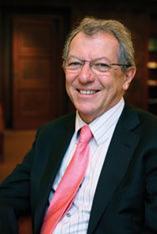
Genetic modification was this week held up as a mechanism for meeting the required 50 per cent increase in food production by 2030 and feeding the projected population of nine billion.
Sir David King of the Smith School of Enterprise and the Environment at the University of Oxford delivered the City Food Lecture in London on Tuesday, in which he linked some of the major issues facing the world today in a “carousel of challenges” including food security, water shortages and terrorism.
His presentation, Managing the Earth’s resources to deliver food for nine billion, identified this set of problems as “the biggest challenge that our civilisation has had to face until now”.
He said: “Our challenge at the beginning was to improve human wellbeing and we did that very well. Our challenge now, as a single planet, is to plan for nine billion people and see how we utilise our resources as we manage that process.”
King insisted that there is a “transparent need” for GM processes in order to improve food security by enabling breeders to develop improved varieties faster and allowing growers to produce food in conditions that would previously have been unsuitable.
He said: “I challenge people to tell me who has suffered from GM foodstuffs and I will tell you who has suffered from the lack of it…
“Why should we reject one technology over a plethora of other technologies? Surely it is better to regulate the product, not the process? Standard plant breeding techniques can take 10-15 times longer than GM and I don’t think the modern world can wait.”
The panel discussion featured Cargill Inc vice-president Paul Conway, Waitrose managing director Mark Price and Soil Association director Patrick Holden, who agreed that action needed to be taken at a global level.
Conway maintained that the industry must use “any technology available” to tackle the interlinked challenges, but insisted that it must be properly regulated.
Price highlighted the problem of food waste, telling guests that 40 per cent of the food produced does not make it to the shelves and of the proportion that does, 30 per cent is not consumed. He also called on the food industry to address what is subsidised, citing the US as an example, “where you can buy a burger for 99c but not broccoli for the same price”.
Holden strongly disagreed with the use of GM and instead emphasised the importance of soil management ahead of what he called the “food crunch”.



